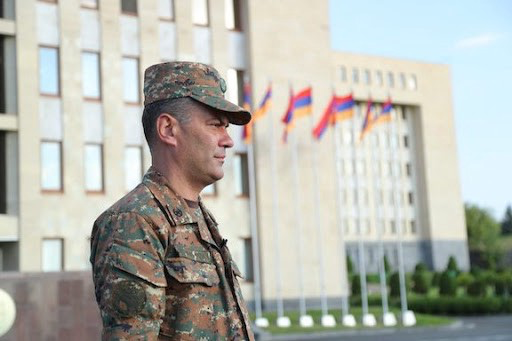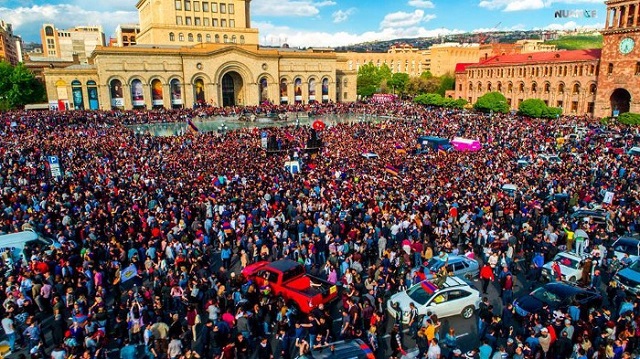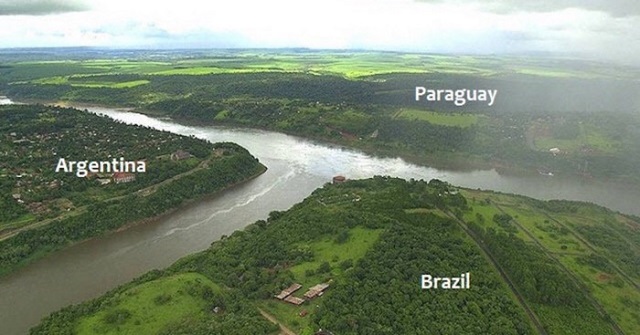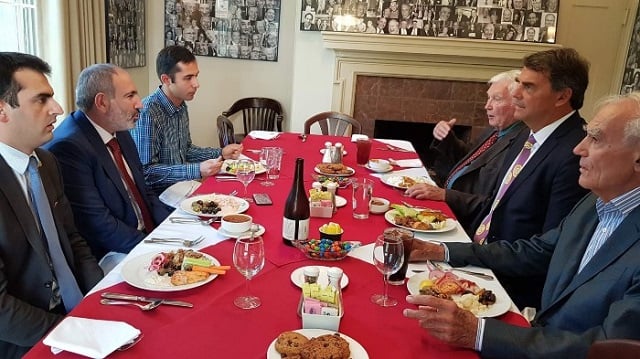medium.com. “I must study Politicks and War that my sons may have liberty to study Mathematicks and Philosophy. My sons ought to study Mathematicks and Philosophy, Geography, natural History, Naval Architecture, navigation, Commerce and Agriculture, in order to give their Children a right to study Painting, Poetry, Musick, Architecture, Statuary, Tapestry and Porcelaine”.
This line was written by John Adams, a Founding Father of the USA, the second President of the United States (1797–1801), in a letter to his wife on May 12, 1780.
In the article below, I’d like to publicly share my views about the model of Armenia’s future, spotlighting some of the most important developments in Armenian world today, as well as proposing some ideas which, in my opinion, may take Armenia to the future as a modern “country”. Of course, my vision is not a comprehensive one and doesn’t claim to be the right one, but it might be thought provoking and may deserve 10 mins of your time. I will focus below on Security, Economy and Culture as the main three pillars of future Armenia. And will try to keep it simple.
The vision expressed in the article is based on my personal research and was significantly influenced by my family and friends, as well Karen Vardanyan (UATE), Tim Draper and other smart people.
Read also
First: Security. Background.
When thinking about the future of Armenia, one of the first issues coming to mind is the Security, simple defense of country’s borders and Armenian lives in the region.
Those who are somehow related to anyone of Armenian descent know about the genocide of Armenians which happened during World War I in the Ottoman Empire (today’s Turkey) starting from 1915 massacres of prominent Armenians of Constantinople (Istanbul). I won’t dive into this as there is already a lot has been produced on the topic.
The thing is that history has a tendency to repeat itself if nothing has been changed in the setup of fundamentals around any situation. Looking into the region around Armenia today, it is clear that today’s establishment of Turkey wants to clear the region from Armenians. Another fundamental is Armenia’s inability to defend itself from Turkey with its today’s own forces. This is where Russia comes into play offering its military protection and, naturally, requiring in return respective exchange of Armenian independence, to some extent.
Security. Tendency and Ideas.
Post-revolution government sees the solution of the Security issue in strengthening Armenian military forces by upgrading Army and developing military technology produced in Armenia. A significant upgrade of the Army is seen during the last year:
a) Armenia buys modern weapons from Russia,
b) Armenian military personnel is being modernized towards becoming a 60,000–80,000 men professional elite force (instead of regular Army),
c) Armenia introduces a sort of “national guard”, which will be called to war in case of need. Most probably, the model is inspired from Switzerland. The “guard” will consist of civilians who have their own military weapon and equipment and will keep it at home. There will be ranks and uniform. “National guards” will be commanded by governors of marzes under the overall command of Army’s Chief of Staff. Number of men mobilized during 2 days with this system can exceed 500,000 (eg. active US Armed Forces are 1.3 million).

Captain Ruben Sanamyan named National Hero of Armenia in August 2020. Besides, 71 others received highest military awards on the same day.
With above mentioned reform of the Army the government wants to make Armenia a stronghold with agile elite force able to defend borders and Armenian lives in the region in case of such need.
On the other side, Armenia is gradually engaging its tech sector into design and production of military tech. Maybe having a military venture capital (VC) firm investing in Armenia and abroad will accelerate the process (eg. Pentagon has a VC arm, CIA too). Usually VC firms in countries like Armenia are capable of having more impact on the development of the ecosystem they work in, rather than only capital allocation. They are intrinsically motivated to generate high-quality pipeline and promote their portfolio companies.
Second: Economy. Background.
I won’t be writing here about the state of today’s economy in Armenia, and even not about a military economy and importance of developing space tech in Armenia. Those are well-written/obvious topics and, unfortunately, Armenia is not a part of military and space tech global value chains, and hardly can become a significant player in the near future.
In order to build a significant component in a global value chain, an “innovative product” based on unique competitive advantages should be designed and offered to the world (eg. Singapore getting into stock exchange global value chain in 1960, allowing money not to sleep when it was a night time in the West).
Republic of Armenia is one of the 193 UN states. There are only 193 countries in the world according to the United Nations. This is where US = Armenia = UK = Argentina = only 189 others = 1.
Economy. Sovereign Individual.
The transition from one stage of economic life to another has always involved a revolution. We think that the Information Revolution is likely to be the most far reaching of all. It will reorganize life more thoroughly than either the Agricultural Revolution or the Industrial Revolution. And its impact will be felt in a fraction of the time. Fasten your seat belts.
This is a paragraph from The Sovereign Individual, a 1996 book by James Dale Davidson and William Rees-Mogg. The book tries to predict the effects of the Information Revolution. The authors analyze the Industrial Revolution and its effect on global economic life, and then try to map that onto the Information Revolution. For those who need a short read (9 mins) instead of the book, here’s a great article.
The book describes dynamics and mechanics behind transition from “Church State” to “Nation State” and predicts the transition from “Nation State” to “Sovereign Individual”.
Each of the State types is based on capital which is based on “violence” (ability to gain and protect the capital) on one side, as well morals and dogmas (authors call it information/myths) on the other side. Right now nation-state citizens function as employees (governance through democracy-based voice), not customers (governance through exit-based capital). So the authors predict that a given company/person will use a tax haven, then use “protection as a service” for safety from violence.
Economy. Re-thinking taxes, visas and State guarantees (insurance).
On Monday, September 23, 2019 the Prime Minister of Armenia, Nikol Pashinyan, had a lunch in Palo Alto with Tim Draper, Bill Draper and Pitch Johnson. During the lunch Tim touched the topic about the future of states and governments. In his opinion, the future of state governance will be drastically changed from treating citizens as employees (now) to customers during the next 20–40 years. The ability of citizen-customers to vote by exiting (especially exiting with their capital) is going to be a cornerstone of future competition between states. “Imagine a world where I consume my healthcare guarantees (subscription-based basic insurance) from one government, my security guarantees from another government and my education guarantees from third country” — Tim was introducing his vision of the future world to the Prime Minister, — “with new and open-minded government, Armenia can tap into this new world as a significant player”. Later, he introduced Estonian e-residency and what other countries have already achieved in this new direction.
If Armenia manages to design and deliver unique services to those who don’t pay taxes in Armenia (and even don’t know about Armenia) and charge them for provided unique services, it could become a producer of “an innovative product” that world wants, by this securing a place under the sun for Armenia in a newly developing global value chain forming around “sovereign individual” economy.
Some of the unique services that Armenia can offer to those who even don’t know about Armenia:
- tax optimization “services” (for details on the thought see the article),
- visa free travel to an unique list of countries, including China, for its citizens (Armenia expressly allows dual citizenship, more on benefits see here),
- significantly affordable healthcare and education guarantees (compared to taxes paid for the same “services” in the Western countries) available to its citizens or e-citizens, a new legal status personas that can be introduced.
With a friend of mine, Joel Burke, a former head of business development of Estonian e-residency, we designed an interesting concept for Armenia around this vision — ABC Republic — where ABC stands for Armenia By Choice. It is a live document based on principles of Armenian national security doctrine and is regularly updated based on our discussions with tech leaders within and without Armenia (already shared with 80+ such leaders). Ping me if you want to see the latest version.
Third: Culture. Background
Fortunately or unfortunately, for the last 2 thousand years Armenia was in the middle of the East and West. Noy, Babylon, Alexander the Great, Persian Empires, Christianity, Romans, Arabs, Byzantine Empire, Crusaders, Mongols, Turks, Russians and Soviet Union — each Armenian knows about these names not from the books of history but from national epic, myths, legends and stories. Being in the midst of significant part of the world’s historical drama, Armenians became one of the most adaptable nations with ability to absorb both from the West and the East, and add what’s specifically theirs.
If we consider Armenian cultural reality and heritage to be anything that was “produced” by Armenians By Choice (people consciously identifying themselves as Armenians) we’ll get UK lords and Hong Kong ministers, Pulitzer-award-winning US writers and Russian Imperial ministers, Venice monks and French senators, Silk road merchants and Timurid ministers — and this weird list can go on and on… what’s common in all such stories is an incredible adaptability and unique leadership that breaks stereotypes and keeps delivering against all odds.
Add to the above that 50–70% of Armenians permanently live outside of Armenia for many generations, in most of the cases.
Culture. The Art and Self-identity today.
With its past lowlights and highlights Armenian Art today is not a primary item on Armenians’ agenda due to poor patronage of today’s Armenian wealth. Naturally, a nation that got its independent state less than 30 years ago, and lives in a hostile environment is mostly concerned, first of all, about its security and, second, about generating wealth.
After 2018 revolution in Armenia, the government made it clear that the mission of the Republic of Armenia is to serve as a guarantor of continuity of Armenian life everywehere. This is yet hardly noticeable vector of change in the self-identity of Armenians by birth, however with perseverance such mission may consolidate a new vision and set of values for Armenians by birth (especially those living in Armenia), and in case of success (measured in increase of security and wealth) it may open doors wide for people of not Armenian descent to join the club.
Where the mind is without fear and the head is held high;
Where knowledge is free;
Where the world has not been broken up into fragments by narrow domestic walls;
Where words come out from the depth of truth;
Where tireless striving stretches its arms towards perfection;
Where the clear stream of reason has not lost its way into the dreary desert sand of dead habit;
Where the mind is led forward by thee into ever-widening thought and action —
Into that heaven of freedom, my Father, let my country awake.
— Rabindranath Tagore
Hambardzum Kaghketsyan
SmartGateVC
Main caption: Velvet Revolution in Armenia, April-May 2018
























































